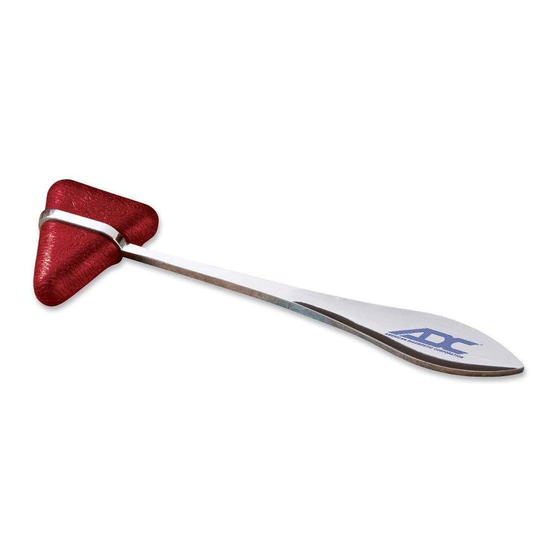
Advertisement
Quick Links
Special Thank You...
Thank you for choosing an DC
goes into the manufacture of each and every product that bears our name. Only the finest materials
are used to assure you of a timeless instrument designed for optimum performance. Please read the
following instructions and general information which will prove helpful in allowing you to enjoy your
DC
®
product.
Sincerely, merican Diagnostic Corporation
Device Description and Intended Use:
ll DC
®
Neurological Percussion Hammers are medical instruments used by healthcare practitioners
to test deep tendon reflexes as part of a neurological physical examination in order to detect abnor-
malities in the central or peripheral nervous system.
ll DC
®
Tuning Forks are medical instruments used by healthcare practitioners to conduct auditory
and neurological testing to identify underlying medical conditions. The Rinne and Webber tests can
be conducted with these devices.
Contraindications:
Neurological Instruments should not be used on damaged or injured locations of a patient' s body
where the use of such a device may cause greater harm or injury.
Warnings and Cautions:
W RNING: Neurological hammers may contain sharp points or components.
Do not leave this device unattended around children.
C UTION: Some neurological hammers may have pointed tips that can cause serious injuries
if used improperly. Care should be taken when handling these devices.
C UTION: No form of sterilization has been validated for this device. Do not autoclave
this device or expose it to extreme environmental conditions as damage to the device may result.
Operation (For all Neurological Hammers):
The Taylor Hammer (3693) is typically held at the end and then swung in an arc-like motion onto
the tendon. The Queen's Square (3699) and Babinski Hammers (3697) are usually held perpendi-
cular to the tendon and passively swung onto the tendon with the assistance of gravity. The Jen-
drassik maneuver can also be used to accentuate reflexes.
Select models (Buck Hammer - 3691 and Babinski Hammer - 3697) have concealed needles
and/or brushes for additional reflex and neurological testing. To use these components, unscrew
the base of the hammer's handle. For Buck Hammers, the concealed needle can be accessed by
unscrewing the top of the device and pulling the needle free.
3699
3697
Operation (For all Tuning Forks):
To operate your tuning fork, hold it as close as possible to the end. For best results, strike the tuning
fork gently against a hard surface near where the forks start. It is not necessary to strike the object
very hard and care should be taken not to strike an object that can be easily damaged, such as a
glass table top or other similar object.
lternately, the tuning fork may be activated by 'snapping' the tips of the forks. Place your thumb
and index figure on the outside of each fork and then slide your fingers off the tip of each fork
while moving them towards each other, as if you were snapping. The motion will set the two
forks vibrating.
500256
500128
Neurological Instruments
Neurological Hammers and Tuning Forks
Neurological Instrument . We're proud of the care and quality that
®
500512
3693
501024
502048
3691
504096
Advertisement

Summary of Contents for ADC 3699
- Page 1 The Taylor Hammer (3693) is typically held at the end and then swung in an arc-like motion onto the tendon. The Queen’s Square (3699) and Babinski Hammers (3697) are usually held perpendi- cular to the tendon and passively swung onto the tendon with the assistance of gravity. The Jen- drassik maneuver can also be used to accentuate reflexes.
- Page 2 Helpful Tips when Holding the Tuning Fork: • Keep your wrist relaxed and flexible. • Keep your fingers firm, but don’t press hard against the stem of the tuning fork. • Your elbow should be bent and relaxed, and your arm should not be tense. •...







